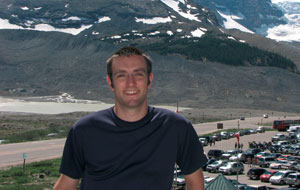
 Dr Matthew Schofield
Dr Matthew Schofield
PhD, Mathematics and Statistics
When Matthew Schofield was entertaining the idea of a PhD, a work colleague gave advice that would echo for years to come: “Choose your supervisor well. It will make or break the PhD.”
Now, looking back on his research into how dynamics of animal populations are modelled, Matthew credits much of his success to his relationship with his supervisor.
It made a surprising amount of difference that his office was next door, believes Matthew. “We'd say 'hi' to each other every day, and just basically check in with each other. So if I had an idea I wanted to run past him, it was very easy and natural to do so.”
“Sometimes I would see him three times in one day. Other times I might go for weeks without a formal meeting.” All the while, Matthew says he felt guided by his supervisor, but never forced along any particular direction.
Above all, says Matthew, “You need a supervisor who takes an interest in your work; not one who makes you do theirs.”
This low-key, respectful relationship helped Matthew learn how to deal with the difficulties of research. When starting out Matthew and his supervisor only had a third of a project in mind. “We decided I would work with some data in the belief that something interesting would come out of it that would eventually shape the rest of the PhD.” The problem was that, come the end of the first year, both student and supervisor were stumped. It took several meetings and – quite simply – a brainwave, to find the path forward.
Despite this, Matthew reports a hassle-free PhD experience. His Bright Futures scholarship attended to his financial and travel needs. The administrative staff were “fantastic”, and the Cracking the Finishing Code workshop “allowed me to do in half a day what could otherwise have taken weeks”. Along the way he attended conferences and published three journal articles.
“I definitely approached the PhD as a job, and not even an especially full-on one. I never worked evenings or weekends, except maybe a bit at the end. I took a couple of big overseas trips. And still, I completed in just on three years.”
The day after Matthew submitted, he jumped on a plane to China, avoiding the nervous post-submission wait some students find especially gruelling. It's a technique he recommends to others: “I pretty much forgot about my thesis altogether.”
Matthew's thesis has been formally recognised by the Division of Sciences as being of exceptional quality.